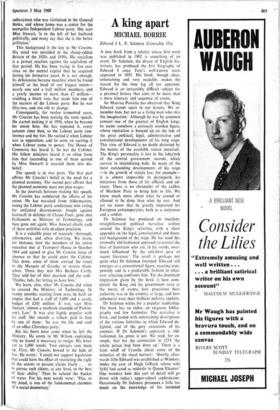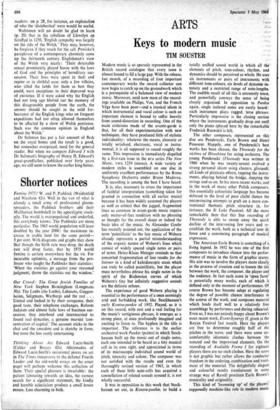A ldng apart
MICHAEL BORRIE
Edward l L. F. Salzman (Constable 35s)
A new book from a scholar whose first work was published in 1902 is something of an event. Dr Salzman, the doyen of English his- torians, has produced the first biography of Edward I since Tout's well-known work appeared in 1893. His book, though clear, entertaining and very readable, makes the reason for the time lag all too apparent. Edward is an intractably difficult subject for a personal history that aims to be more than a mere itinerary and sequence of events.
Sir Maurice Powicke has observed that 'King Edward stands apart in our history. We re- member-him, but not as a living man who stirs the-imagination.' Although he was by common consent one of the greatest of English kings, he seems somehow a curiously wooden figure, whose reputation is buoyed up on the tide of the great political, legal, administrative and constitutional developments of his long reign. This view of Edward is no doubt distorted by the nature of the available source materials. The King's personality is lost in the labyrinth of the central government records, which survive in intimidating bulk. In many of the most outstanding developments of his reign —in the growth of statute law, for example— it is almost impossible to distinguish his initiatives from those of his officials and ad- visers. There is no chronicler of the calibre of Matthew Paris to bring him to life. We know much more about what he caused or allowed to be done than what he was. And yet we know that he greatly impressed his European contemporaries, both as a statesman and a soldier.
Dr Salzman has produced an excellent, straightforward political narrative written around the King's activities, with a short appendix on the legal, constitutional and finan- cial background of the reign. He has used this avowetlly old-fashioned approach to correct the bias of historians who are, in his words, over- much influenced 'by the anti-hero pose of recent literature.' The result is perhaps not quite what Dr Salzman intended. Edward still emerges as a conventional figure, reacting com- petently and in a predictable fashion to what- ever situation confronts him. Yet the dominant impression given by the book is how com- pletely the King and his government were at the mercy of events, how precarious their authority was in the country at large, and how ephemeral were their brilliant military exploits.
Dr Salzman writes for a popular readership. The book has an index, an exiguous biblio- graphy and few footnotes. The narrative is brisk, and larded with entertaining descriptions of the various festivities in which Edward de- lighted, and of the gory executions of his enemies. If Dr Salzman's approach is old- fashioned, his prose is not. We read, for ex- ample, that for the coronation in 1274 'the whole palace had been done up.' There is a faint whiff of Crawfie about some of the minutiae of the royal nurture: 'Shortly after- wards little Edward was established at Windsor, under the care of Hugh Giffard, whose wife Sybil had acted as midwife to Queen Eleanor.' One wonders how this sort of detail will go down with today's upper-school sophisticates. Occasionally Dr Salzman presumes a little too much on the knowledge of his intended readers: on p. 28, for instance, an explanation of who the 'disinherited' were would be useful.
Welshmen will no doubt be glad to learn (p. 20) that in the rebellion of Llewelyn ap Gruffyd in 1256, 'English sympathy was largely on the side of the Welsh.' They may, however, be forgiven if they reach for the salt. Powicke's paraphrase of a contemporary chronicle sums up the thirteenth century Englishman's view of the Welsh very nicely: 'Their detestable sexual promiscuity played havoc with the laws of God and the principles of hereditary suc- cession. Their lives were spent in theft and rapine or in slothful ease; only, a few villeins, who tilled the lands for them as best they could, were exceptions to their depraved way of existence. If it were asked why the English had not long ago blotted out the memory of this disagreeable people from the earth, the answer should be sought in the mild for- bearance of the English kings who on frequent expeditions had too often allowed themselves to be affected by a show of Welsh penitence. Such was the common opinion in England about the Welsh.' . .
Dr Salzman has put a fair amount of flesh on the royal bones and the result is a good, but somewhat overpriced, meal for the general reader. But when we compare Edward I with Dr Salzman's biography of Henry II, Edward's great-grandfather, published over forty years ago, we still seem to know the earlier king better.







































 Previous page
Previous page